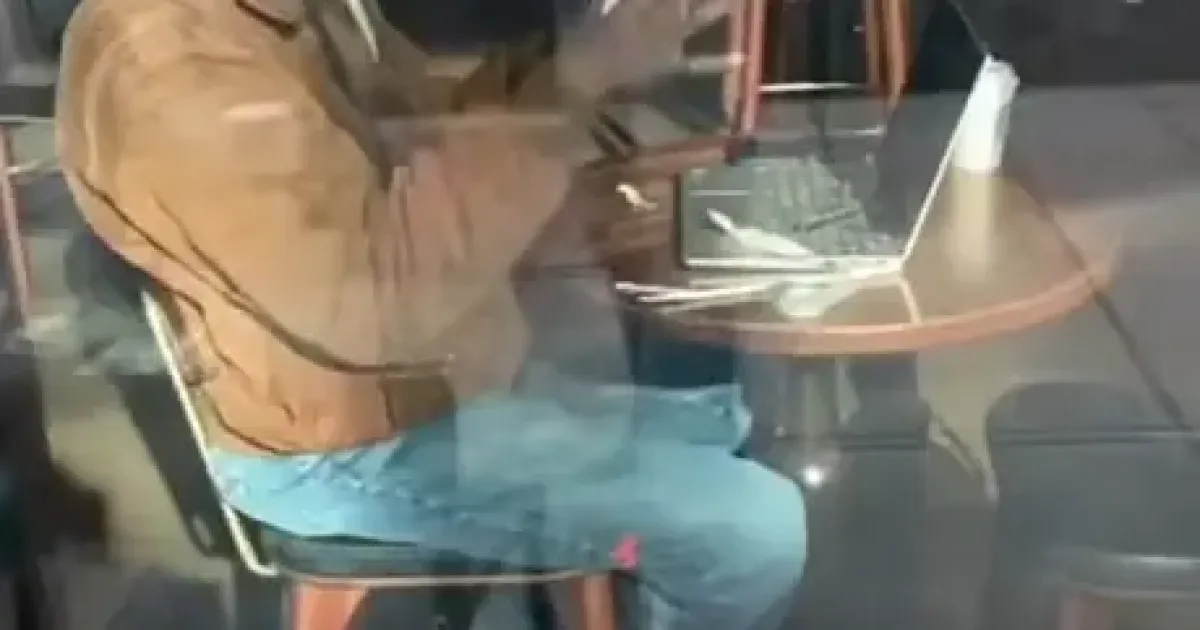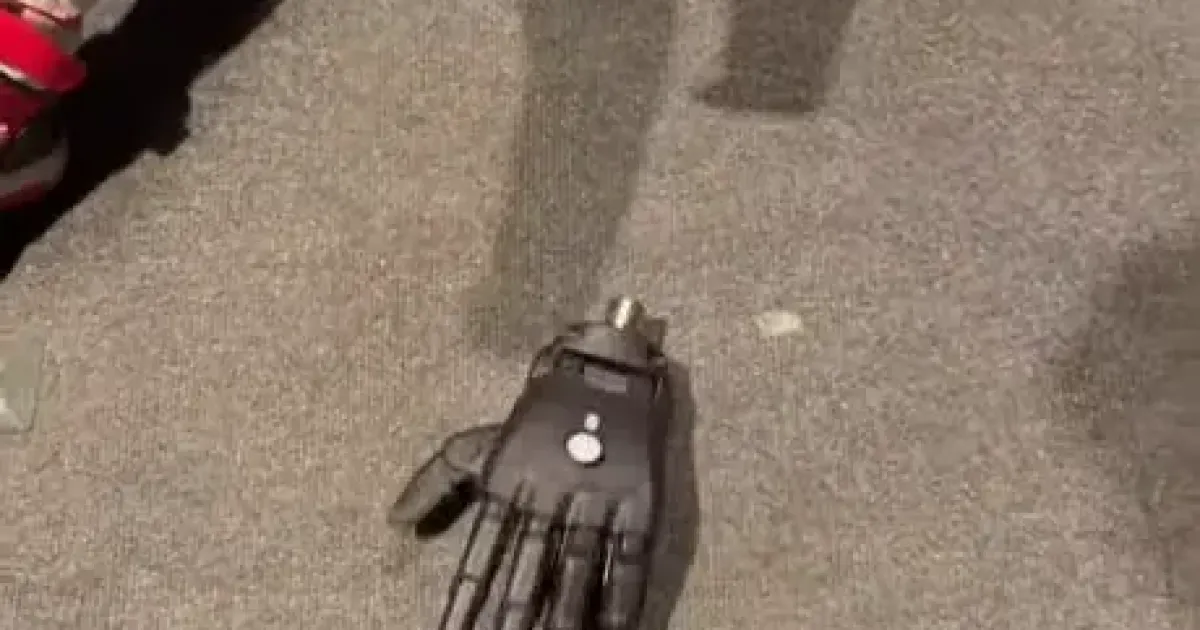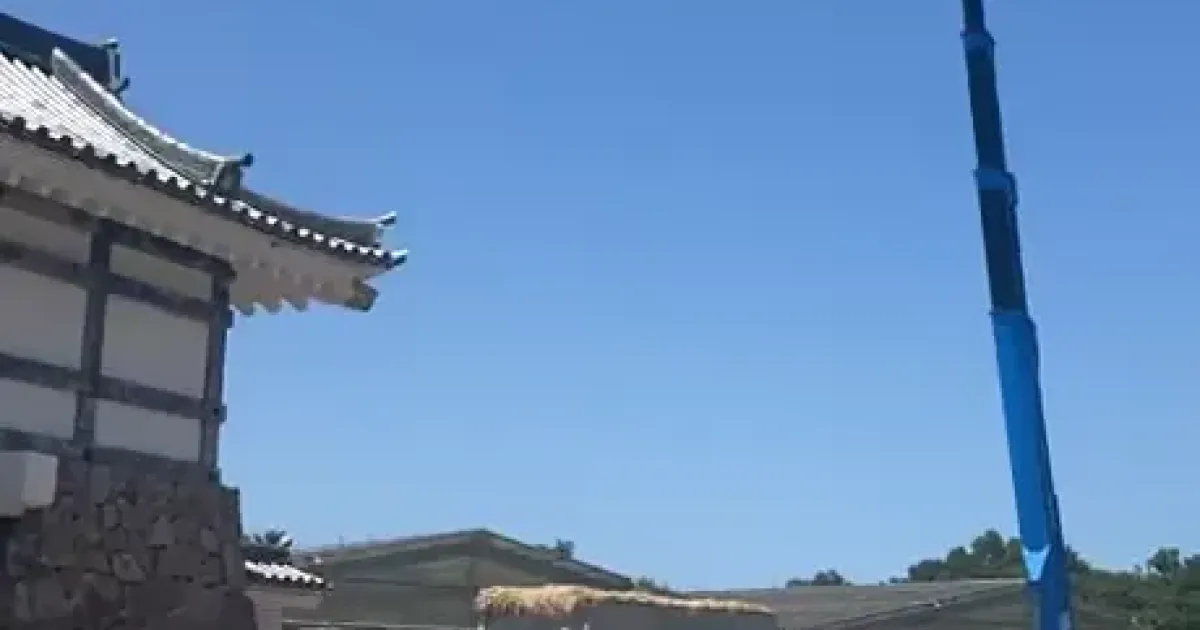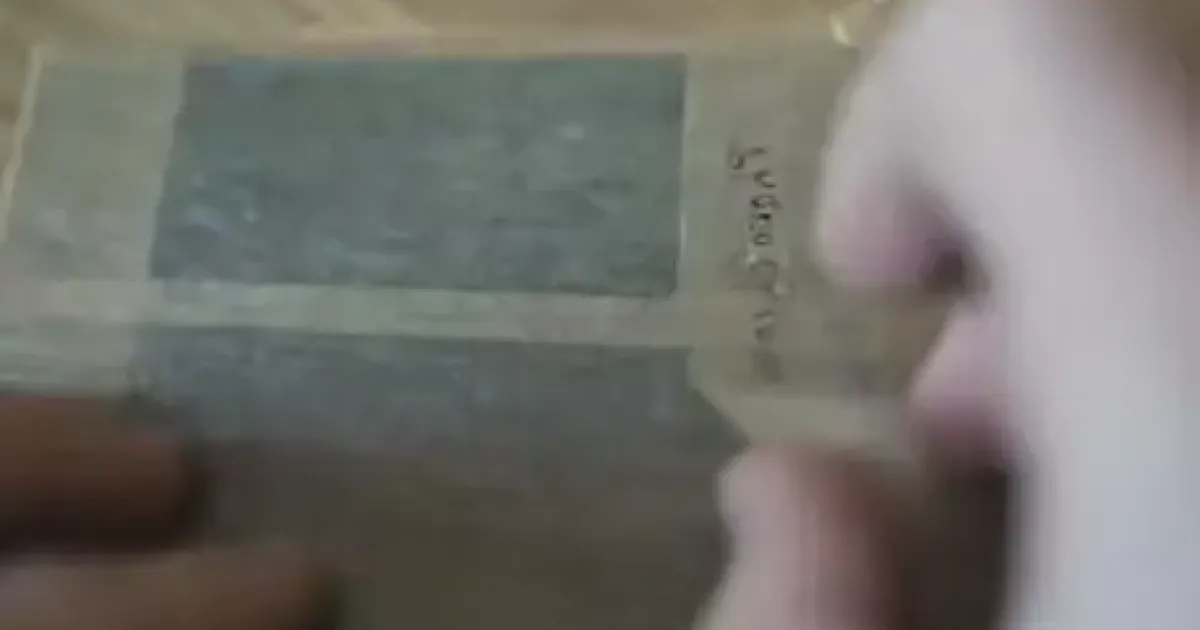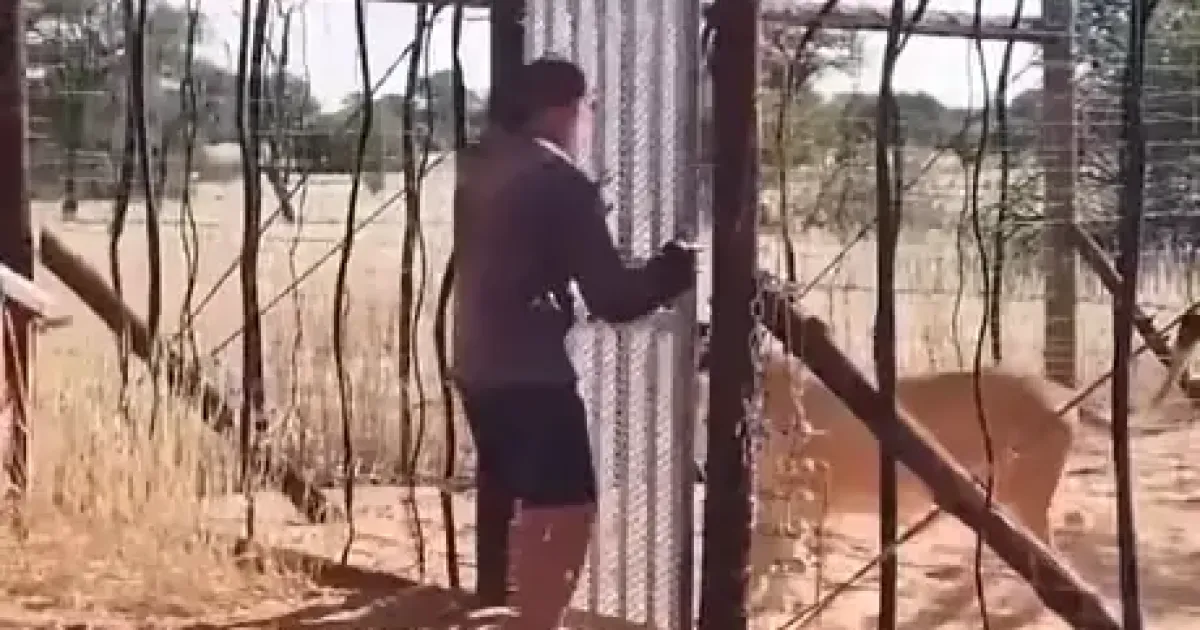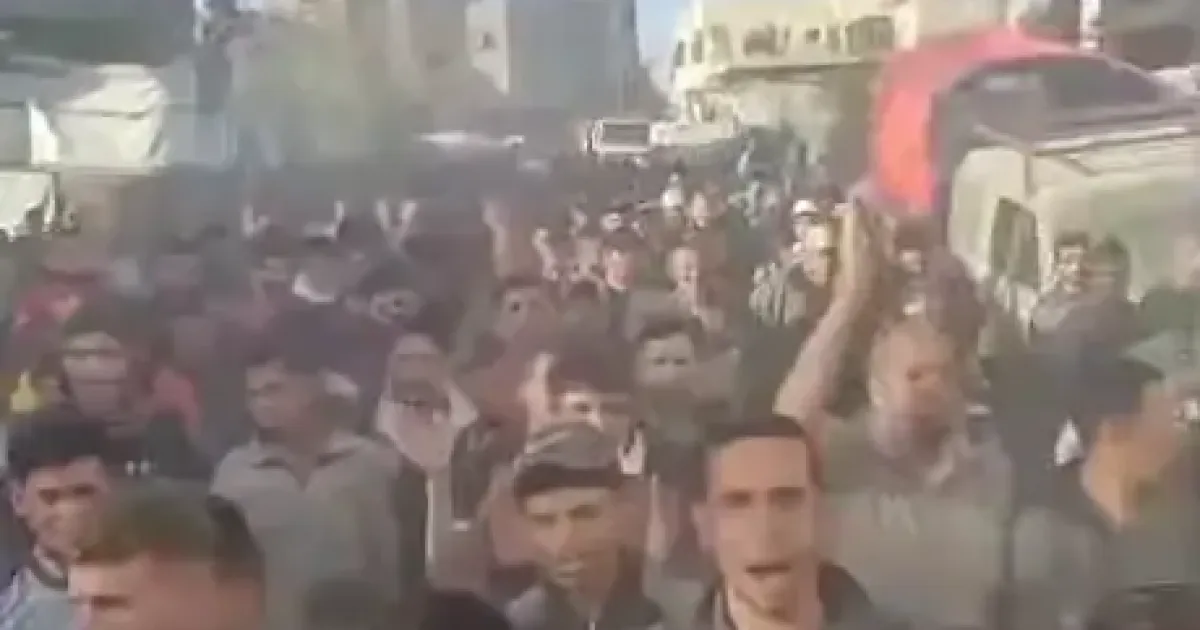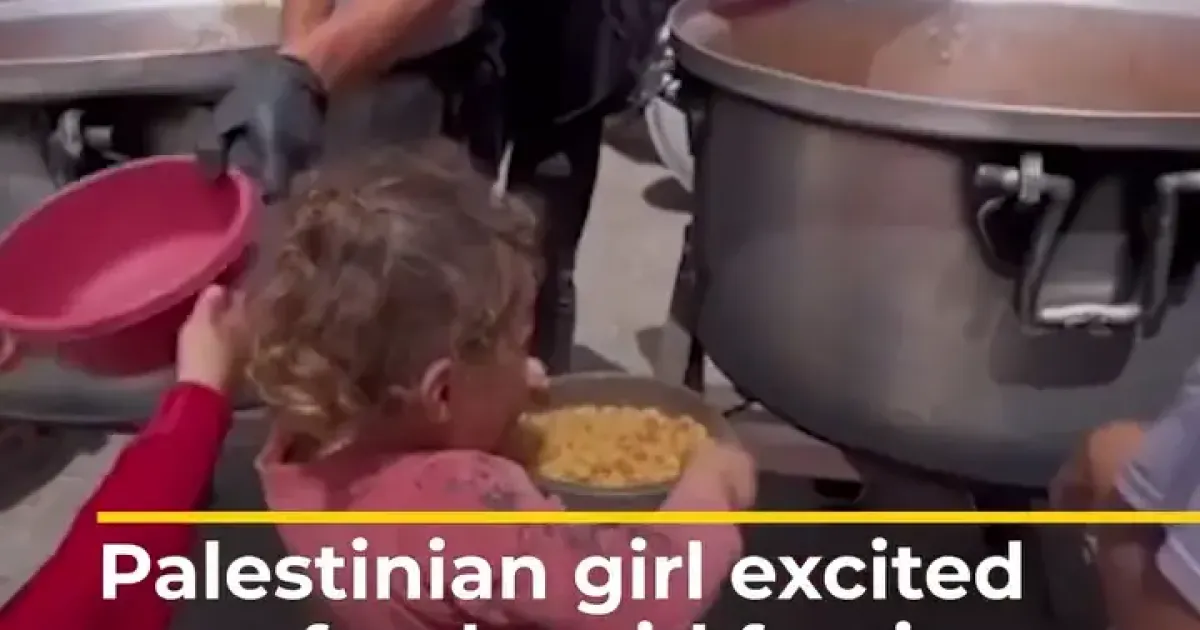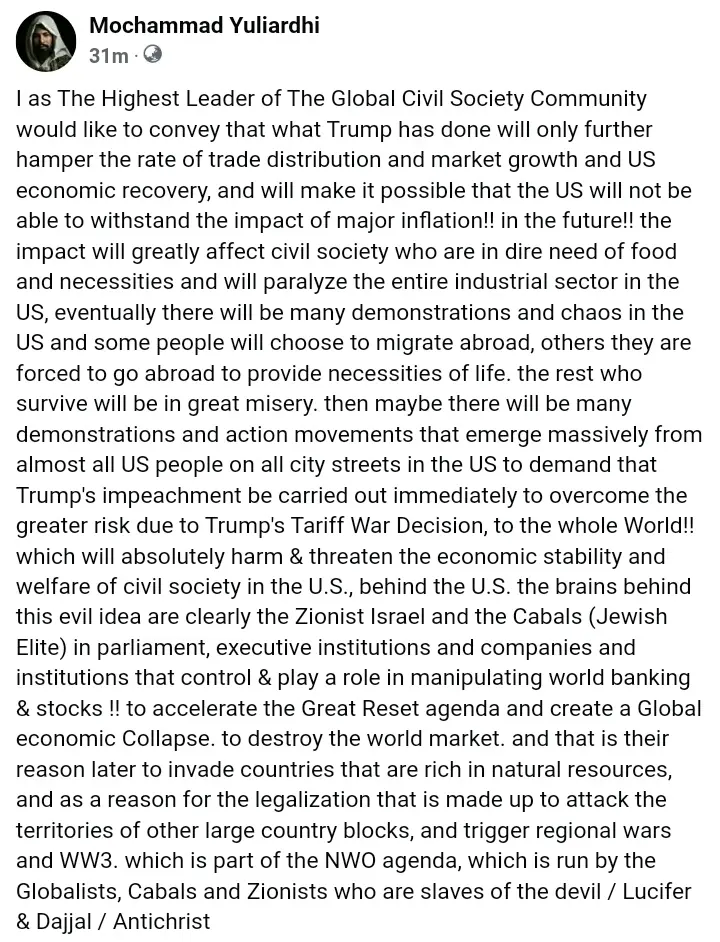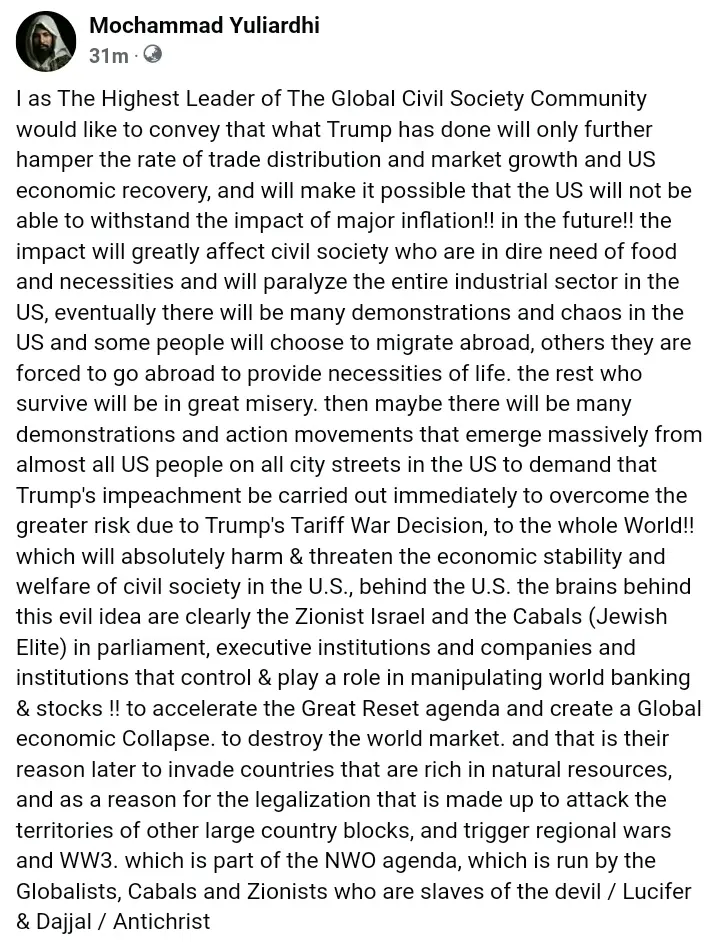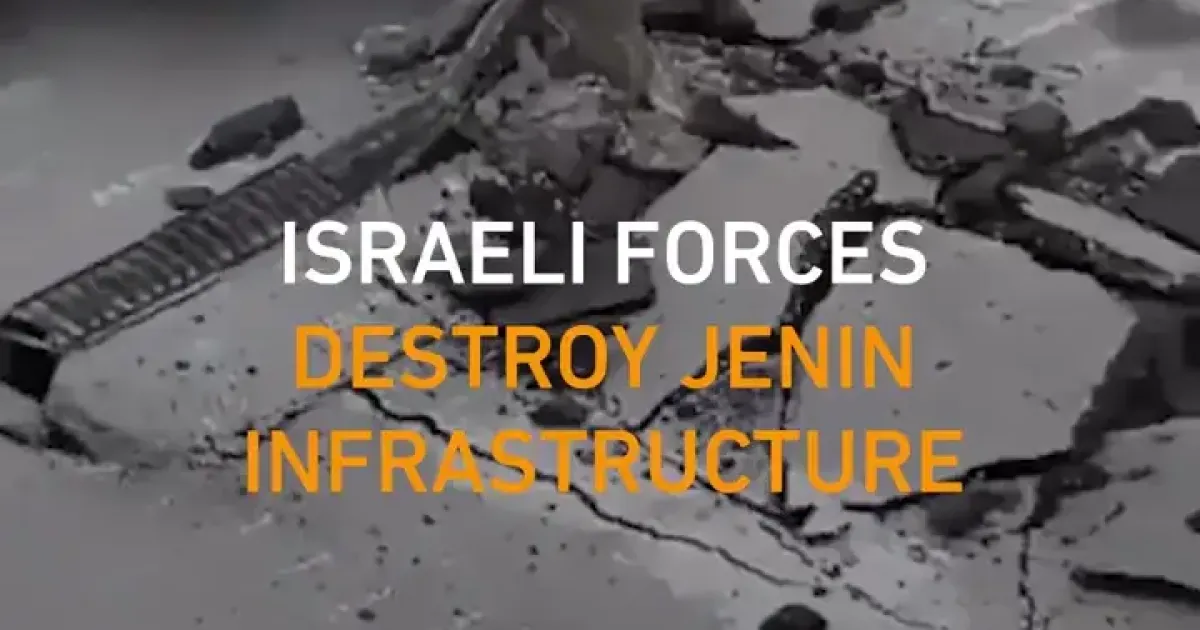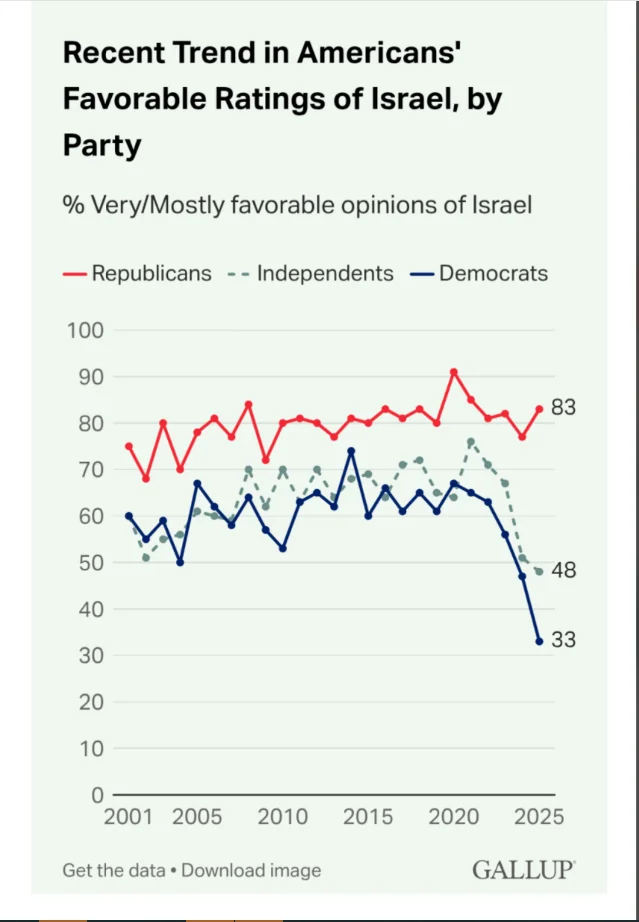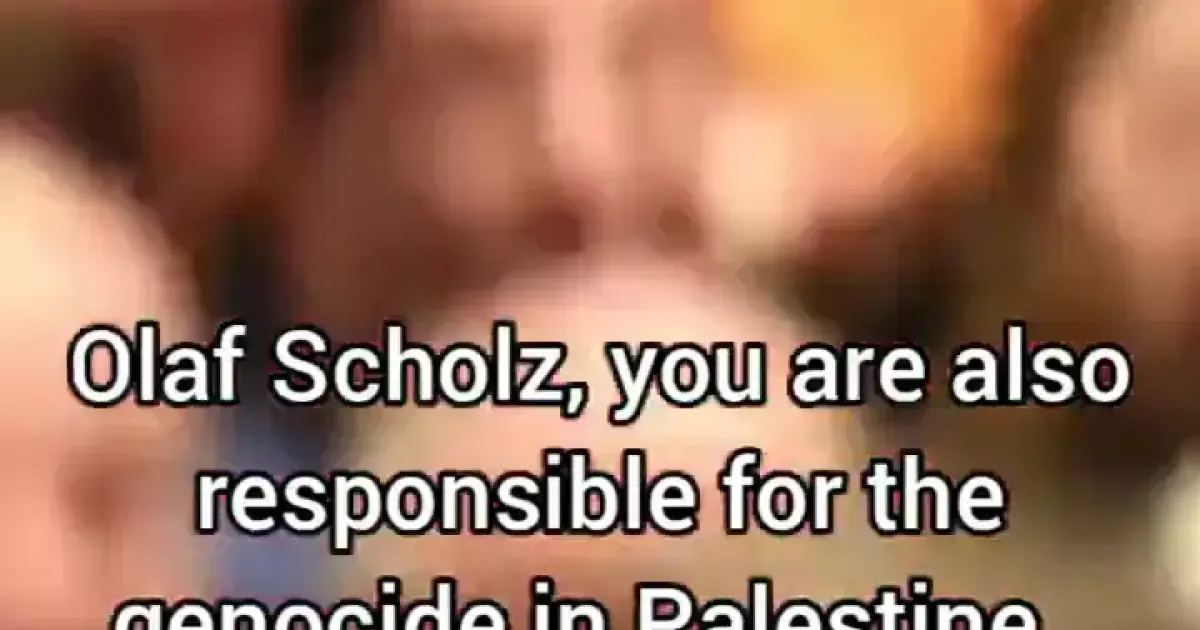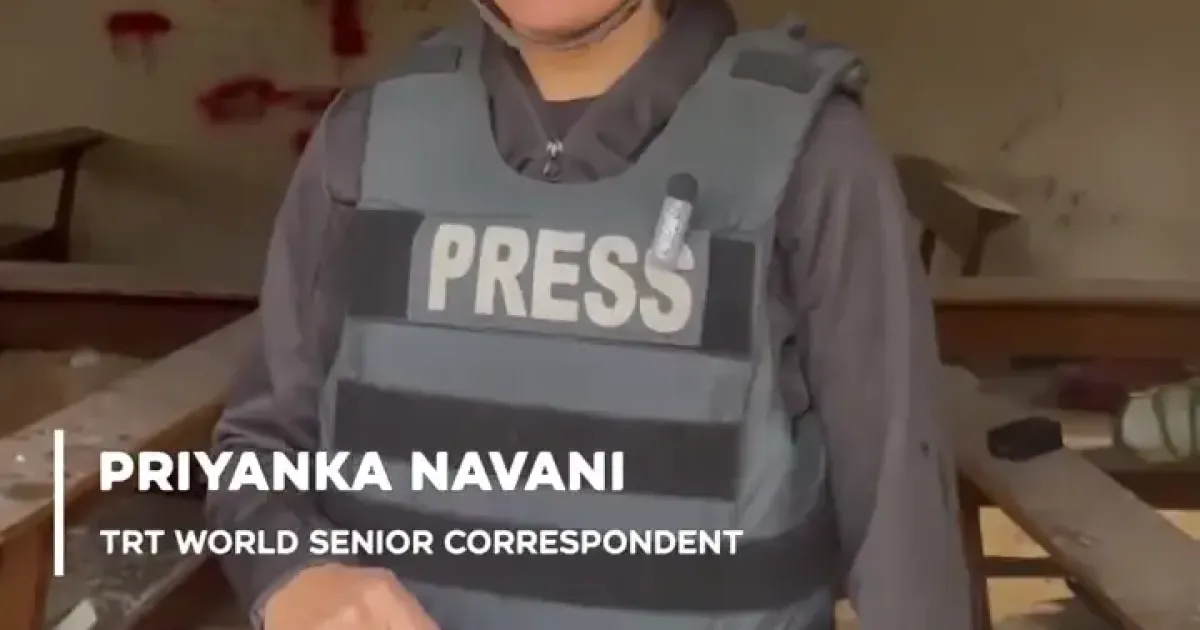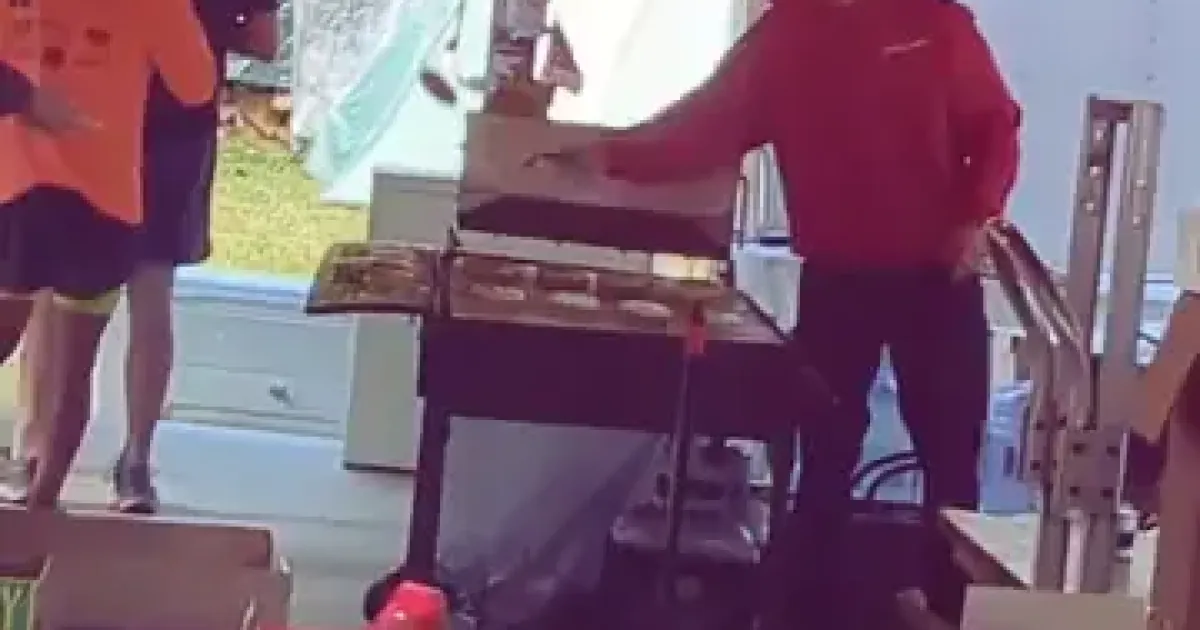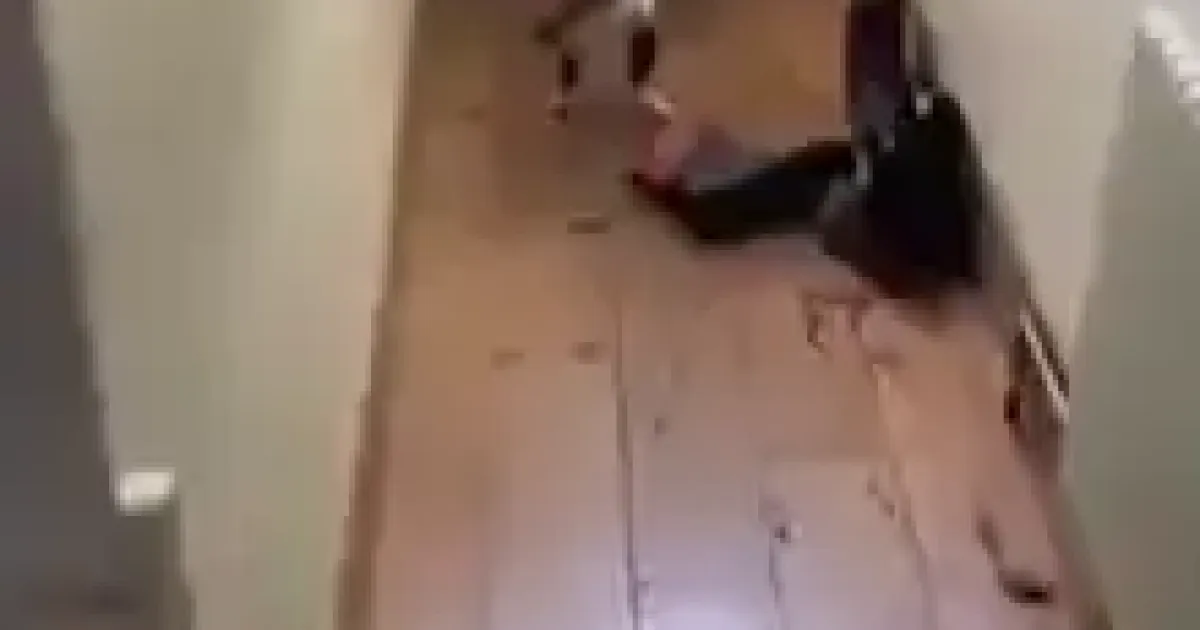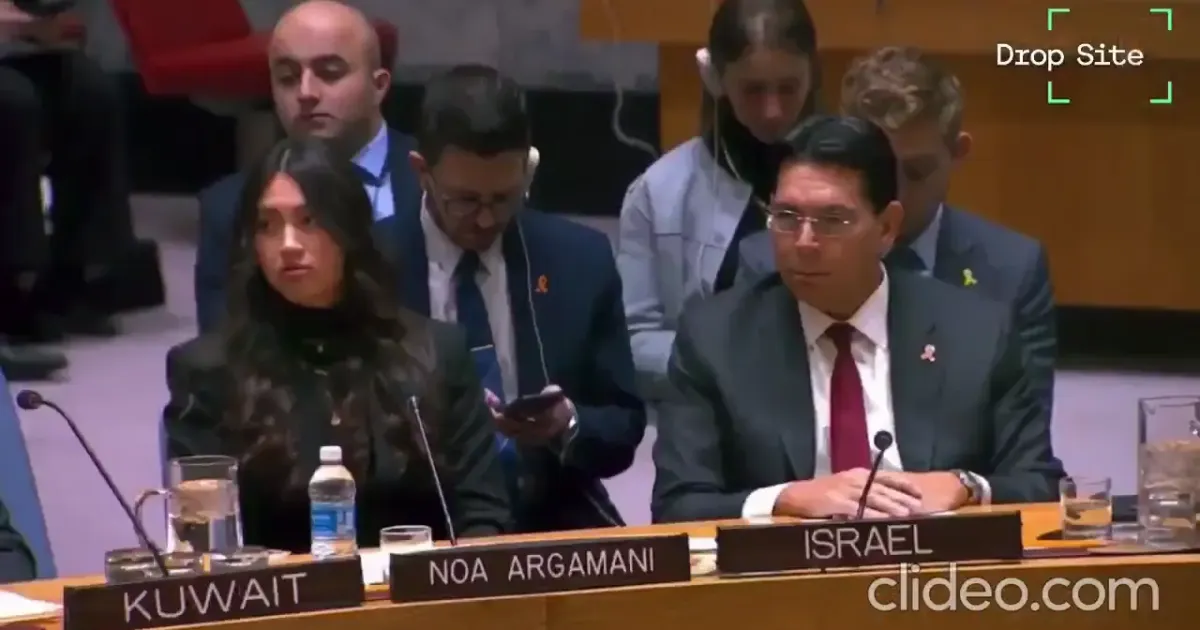
Dan Levy on the Conflict: "A Minute of Silence for Each Lost Child Would Last Over 300 Hours"
Former Israeli Peace negotiator Dan Levy: “A minute of silence for each of the Bibas children would be appropriate, as would a minute of silence for each of the more than 18,000 Palestinian children murdered in Israel's devastation of Gaza. That silence would extend to over 300 hours."
#News #Palestine #War #Gaza #Israel
Read More...

Israel says it is conducting strikes in southern Syria.
Intervention comes hours after FM called Syrian regime “a Jihadist Islamic terrorist group” that “took control by force” and “has been killing minorities”
#Israel #News #Syria
Read More...
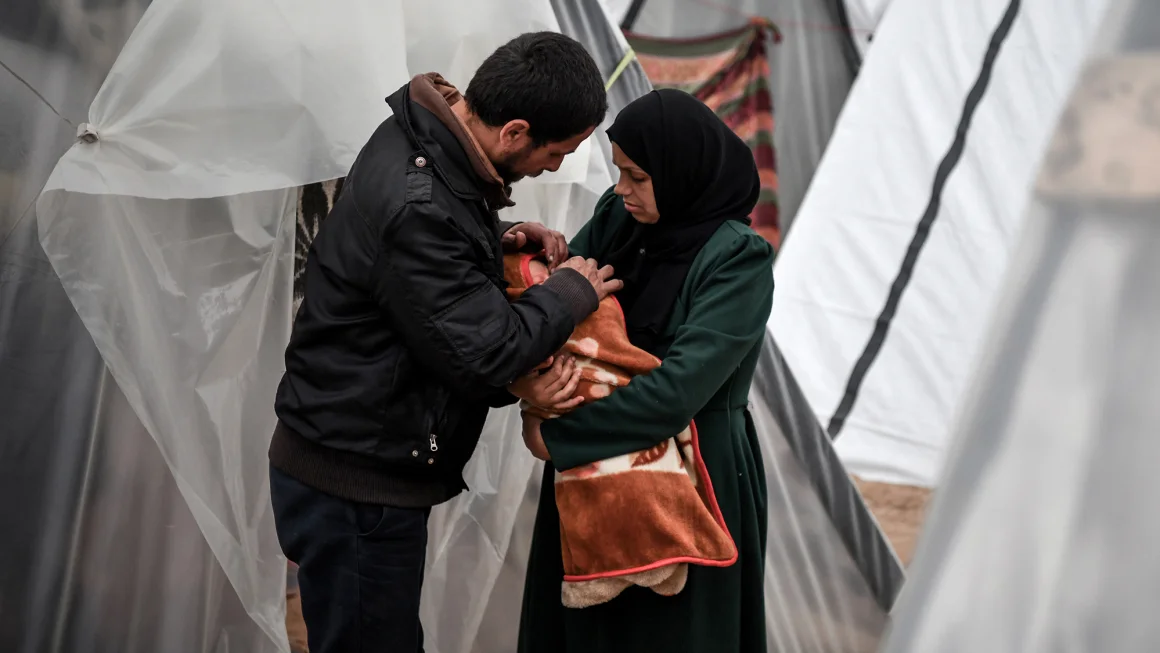
Israel’s war inflicted ‘life-threatening danger’ on pregnant women and girls in Gaza, Human Rights Watch says
Israel has inflicted “serious and sometimes life-threatening danger” on pregnant and postpartum women and girls in Gaza over 15 months of bombardment and siege, according to a new Human Rights Watch report.
The 50-page report, “‘Five Babies in One Incubator’: Violations of Pregnant Women’s Rights Amid Israel’s Assault on Gaza,” was published by the US-based advocacy group on Tuesday.
It details attacks on medical facilities and healthcare workers in Gaza that “directly harmed women and girls during pregnancy, childbirth, and the postpartum period” and says the war has increased the risk of miscarriage, preterm birth, stillbirth, postpartum hemorrhage and underweight newborns.
HRW accused Israel of enforcing an unlawful blockade, a near-total ban on water, food and electricity, starvation as a method of war, attacks on the medical system, and repeated forcible transfer – violating the right to follow-up and postnatal care for pregnant women and girls, and their children.
Israel is “obligated to use all the resources at its disposal to ensure that everyone in Gaza, including pregnant women and girls and their children, are able to enjoy their human right to health,” the report said. “This includes ensuring the full restoration of Gaza’s healthcare system so that all patients, including pregnant women and babies, have access to quality medical care.”
HRW repeated allegations that Israel is committing genocide against Palestinians in Gaza, which Israel strongly denies. Israel has also been taken to the UN’s top court, the International Court of Justice, on allegations of genocide.
CNN has reached out to the Israeli military and COGAT, the Israeli aid agency, for comment.
Responding to a question about Israeli attacks on medical facilities and health care workers in Gaza, the Israel Defense Forces (IDF) repeated allegations that Hamas uses hospitals for its military operations. Hamas denies using hospitals as cover. CNN cannot independently verify either claim.
COGAT denied blocking relief, delaying the entry of fuel, or limiting the number of humanitarian teams that can go into Gaza, in a statement to CNN.
About 66,474 aid trucks have entered the strip, the agency said. More than 11,000 requests for humanitarian coordination across Gaza were approved, COGAT added. Since October 7, more than 30,460 tons of medical equipment have been transferred, over 53,040 tons of water have been transported through crossings, according to COGAT. The agency said it had facilitated the entry of over 1,300 doctors and humanitarian teams entering and exiting Gaza.
Israel’s onslaught since the Hamas-led October 7 attacks has wiped out entire families, decimated the medical system, and supplies, spawning starvation, disease and displacement.
At least 47,306 Palestinians have been killed in Gaza, according to the Ministry of Health there. Of those, 12,316 were women and another 808 were babies under aged one, Gaza’s Government Media Office (GMO) reported on January 24. Although a fragile ceasefire began last week, the survival challenges facing new and expecting mothers in the enclave remains dire.
Babies dying ‘in front of us’
More than 1,054 health workers and medical professionals have been killed, including at least six pediatricians and five obstetrician-gynecologists, HRW said, citing the health ministry in Gaza.
As of January, emergency obstetric and newborn care is available at seven out of 18 partially functioning hospitals in Gaza, four out of 11 field hospitals, and one community health center, according to HRW.
The rate of miscarriage in Gaza has increased by 300% since October 7, 2023, the International Planned Parenthood Federation said in July. Two Palestinian women told HRW their fetuses died after they were injured by explosive weapons attacks that also killed their partners.
Even for those who make it to a medical facility, hospitals offer little respite. Women can be “rushed out” within hours of childbirth because staff are overwhelmed by scores of patients injured by bombardment, according to HRW.
Mayas Sufyan Musa, 25, told CNN that when she journeyed on foot to Al-Emirati Hospital, in Rafah, to give birth to her daughter, Maria, on February 27, she was startled by crowds of desperate Palestinians seeking refuge.
“I did not get complete and sufficient privacy during my birth. I was very afraid of bleeding,” said Musa. “I faced great difficulty in giving birth due to fear of the shelling next to the hospital.
“My husband was informed that I had to leave immediately … It was a very difficult moment, and the cleanliness in the hospital was non-existent.”
For pregnant women in Gaza, the stress of trying to survive attacks coupled with food and water shortages could weaken the immune system, harm the fetus, and lead to preterm birth, HRW said. Dr Adnan Radi, a medic at Al Awda Hospital, in northern Gaza, told the agency that most of the babies delivered by staff have severely low birthweight and are dying of perinatal asphyxia.
“We try to intubate the babies. Sometimes it has helped, but the picture is very gloomy,” Dr. Radi said in the HRW report, adding that “in the last month I can remember more than six babies with low birthweight dying in front of me.”
Meanwhile, shortages of antibacterial materials can increase the risk of sepsis, pneumonia, and meningitis among newborns, Maram Al Shurafa, an aid worker for the NGO, Medical Aid for Palestinians (MAP) in Gaza, told CNN.
‘I started begging that God would take the baby’
In sprawling displacement camps, parents say they cannot find enough food, clean water, warmth or sanitation facilities. Instead, caregivers resort to feeding babies with infant formula made from dirty water, compounding the risk of dehydration, hepatitis A and skin infections according to HRW.
Pregnant and breastfeeding women sharing toilets in crowded spaces are especially vulnerable to infections including UTIs, which can lead to preterm labor, low birth weight, and stillbirths, according to Al Shurafa, a program officer for MAP.
“Women may feel uncomfortable or self-conscious breastfeeding in such conditions,” said Al Shurafa. “This lack of privacy can lead to stress and anxiety, which in turn affects the mother’s ability to relax and establish a successful breastfeeding routine.”
More than 48,000 pregnant women are experiencing emergency or catastrophic food insecurity, the UN’s reproductive rights agency said in December.
At least 56 children have starved to death, according to Zahir Al-Wahidi, the director of Information Systems at Gaza’s health ministry. Eight infants and newborns have reportedly died from hypothermia, the UN’s children’s agency said in January.
Musa, who is displaced in Deir al-Balah, central Gaza, told CNN that baby Maria, is malnourished.
“The severity and ferocity of the suffering was concentrated in physical displacement,” she said. “I was afraid that we would be exposed to direct shelling or missile fragments, and from the rain and cold and the flooding of the tents.”
Israa Mazen Diab al-Ghul, 30, a pregnant woman displaced in Nuseirat, central Gaza, told HRW that in early 2024, she and her relatives had nothing to drink but sea water for two days. “I vomited, and I was worried it would kill the baby … I started begging that God would take the baby, so I wouldn’t need to give birth during this war.”
Communications disruptions impede womens’ access to hotlines and online information, while power cuts disrupt ultrasounds, and blood and urine tests, HRW said.
One prenatal care patient displaced in Khan Younis, southern Gaza, told CNN she fainted by the time she arrived at Al-Awda Hospital, because she was so exhausted by traveling on foot and lack of nutrition. She could not afford vitamins to alleviate her symptoms.
“Everything is scarce,” said Rahaf Umm Khaled, 21, who is four months pregnant. “I want the war to end completely. I want to give birth to my child in good health, and I want us to return to our homes safely and soundly.”
#palestine #news
Read More...
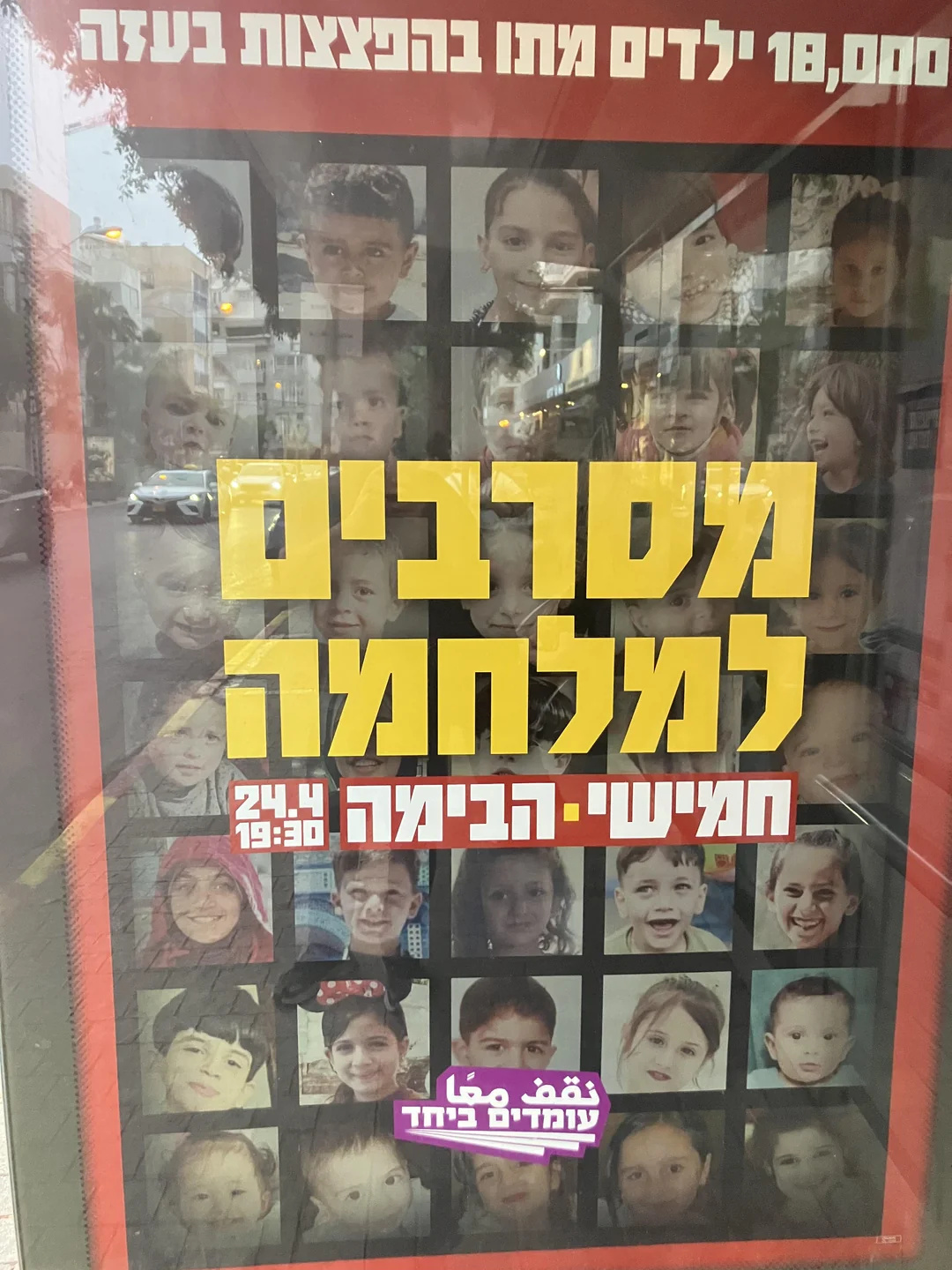
Israelis protesting the killing of children in Gaza on Holocaust Memorial Day.
“Refusing the war: 18,000 children killed since we started bombing Gaza”.
These billboards are scattered all over Tel-Aviv today, the protest is in one of the most central squares in Israel, where last time we hade 100,000k protesters. Hopefully we can do the same tomorrow.
I’m hreatbroken that these protests don’t get more exposure, and hopefully this won’t be taken down here.
It seems like in Europe and the U.S., the Israeli anti-war protest don’t fit the narratives of neither the right or the left, so they are just ignored.
Mods: this is a billboard, I think it’s considered news despite not being an article - I didn’t see a clear rule about not posting images, it’s not 100% of the post must be an article or just if the headline needs to to be the same as the article IF it’s an article.
I hope you will consider the importance of this unreported news when making your decision about whether this breaks the rules or not. ♥️
#Palestine #Kids #Israel
Read More...
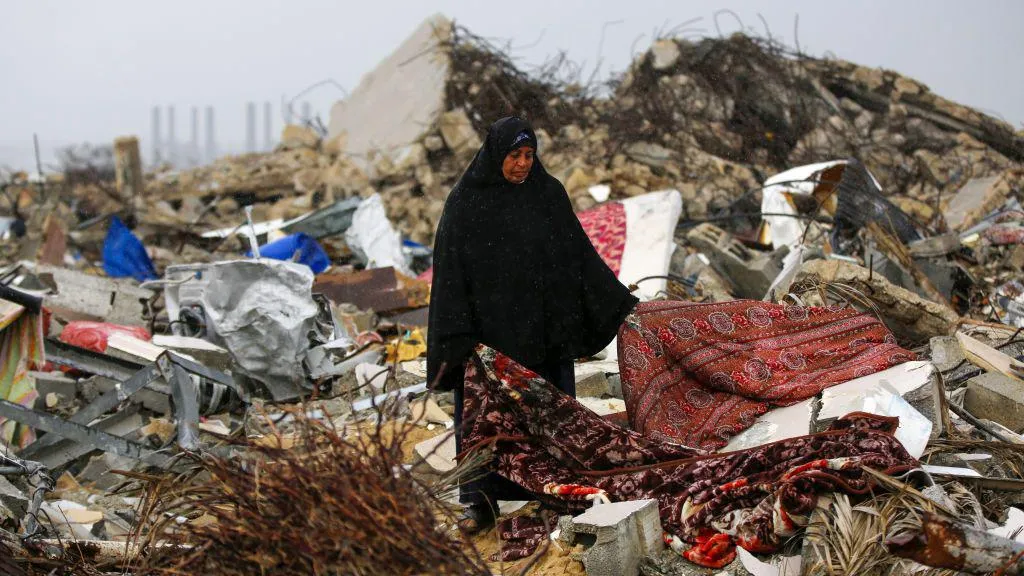
Egypt to present 'vision' to rebuild Gaza without displacement
Egypt has said it is working on a "comprehensive vision" for the reconstruction of the war-torn Gaza Strip that guarantees Palestinians the right to stay on their land, unlike the proposal put forward by US President Donald Trump.
The Egyptian foreign ministry said it hoped to co-operate with the Trump administration to reach "a just settlement of the Palestinian cause".
It followed Trump's meeting with Jordan's King Abdullah on Tuesday, where he doubled down on his plan for the US to take over Gaza and permanently move the two million Palestinians living there to Jordan, Egypt and other locations.
Abdullah said every Arab state rejected the idea, and that Egypt would present an alternative.
The UN has warned that any forced displacement of the territory's population would be illegal under international law and "tantamount to ethnic cleansing".
It comes amid growing concern that the fighting in Gaza could resume, after Israel's prime minister warned Hamas it would end the ceasefire if the Palestinian armed group "does not return our hostages by Saturday".
Benjamin Netanyahu issued the ultimatum after Hamas said it was postponing freeing more hostages until further notice, claiming Israel had violated the terms of the ceasefire deal.
Sitting alongside King Abdullah at the White House on Tuesday, Trump said there had been "great progress" on his proposal to take over Gaza.
"With the United States being in control of that piece of land... you can have stability in the Middle East for the first time," he told reporters. "And the Palestinians, or the people that live now in Gaza, will be living beautifully in another location."
When pressed by the reporters to comment on the plan to force the Palestinians to relocate to Jordan, King Abdullah said: "We have to keep in mind that there is a plan from Egypt and the Arab countries."
Later, the king wrote on X that he had "reiterated Jordan's steadfast position against the displacement of Palestinians in Gaza and the West Bank" during the meeting, adding: "This is the unified Arab position."
Trump had said before the meeting that he could "conceivably" halt aid to Jordan and Egypt if they refused to co-operate with his plan and take in displaced Gazans.
Not long after the king's remarks, Egypt's foreign ministry said it hoped to co-operate with the Trump administration to reach "a just settlement of the Palestinian cause".
"In this context, Egypt affirms its intention to present a comprehensive vision for the reconstruction of the Gaza Strip, in a manner that ensures the Palestinian people stay on their land, and in line with the legitimate and legal rights of this people," it added, without giving any details.
President Abdul Fattah al-Sisi also told Danish Prime Minister Mette Frederiksen in a phone call on Tuesday that the reconstruction of Gaza must happen "without displacing Palestinians", his office said.
It was not immediately clear when Egypt would present its alternative Gaza plan.
Cairo is due to host an emergency Arab summit to discuss the "serious" developments for Palestinians on 27 February, while King Abdullah said Saudi Crown Prince Mohammed bin Salman had invited Arab leaders to Riyadh at an unspecified date.
Sisi was also given an open invitation by Trump to visit the White House during a phone call earlier this month. However, Egyptian security sources told Reuters news agency on Wednesday that Sisi would not travel to Washington if the agenda included Trump's plan.
Abeer Barakat, a Palestinian teacher in Gaza City, told the BBC she believed Trump's plan was "impossible to achieve" but that it had infuriated people.
"We worry that Jordan and Egypt are going to bend from Trump's threats," she said.
Palestinians fear a repeat of the Nakba - the Arabic word for "catastrophe" - when hundreds of thousands fled or were driven from their homes before and during the war that followed the creation of the State of Israel in 1948.
Many of those refugees ended up in Gaza, where they and their descendants make up three quarters of the population. Another 900,000 registered refugees live in the occupied West Bank, while 3.4 million others live in Jordan, Syria and Lebanon, according to the UN.
Asked by reporters on Monday if the US would force Palestinians to leave Gaza, Trump replied that "they're all going to want to leave". He also said in an interview that Gazans would have no right of return because he was "talking about building a permanent place for them".
The Israeli military launched a campaign to destroy Hamas in response to an unprecedented cross-border attack on 7 October 2023, in which about 1,200 people were killed and 251 were taken hostage.
More than 48,220 people have been killed in Gaza since then, according to the territory's Hamas-run health ministry.
Most of Gaza's population has also been displaced multiple times, almost 70% of buildings are estimated to be damaged or destroyed, the healthcare, water, sanitation and hygiene systems have collapsed, and there are shortages of food, fuel, medicine and shelter.
#news #Israel #Gaza #Egypt #Palestinian #territories #DonaldTrump #Jordan #UnitedStates
Read More...
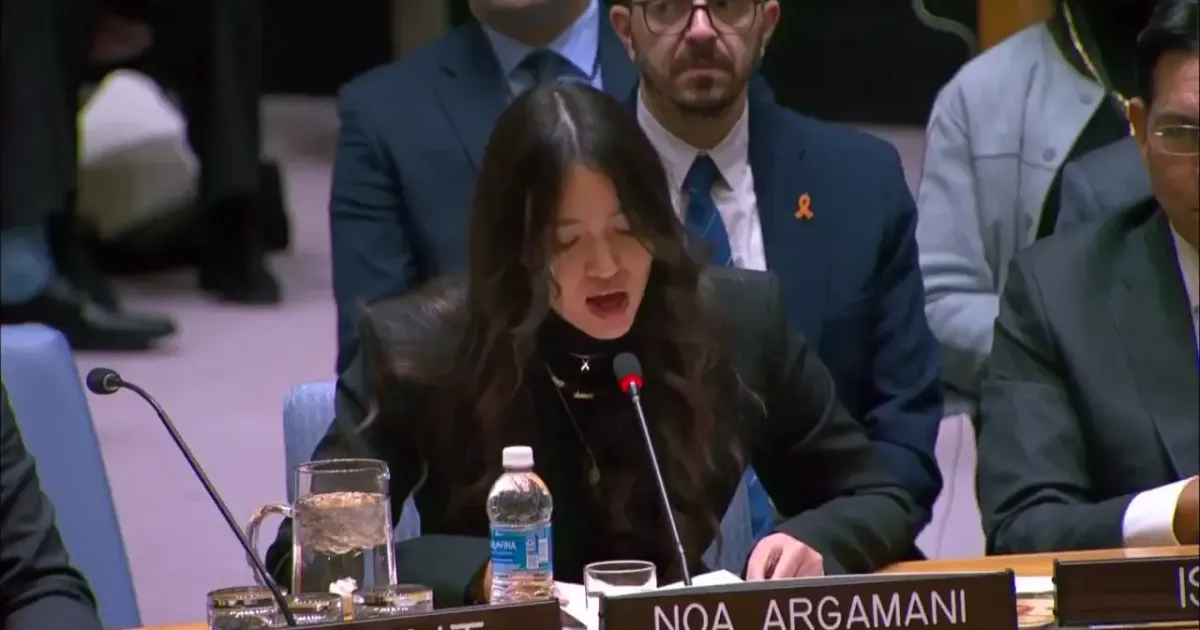
Former Israeli Captive Noa Argamani Tells UN: Israeli Airstrikes Targeted Us, Killing Fellow Hostage
Former Israeli captive, Noa Argamani, describes at the United Nations how Israeli airstrikes targeted them during their captivity, killing her fellow captive Yossi Sharabi and nearly killing her too
#ONU #News #Israel
Read More...
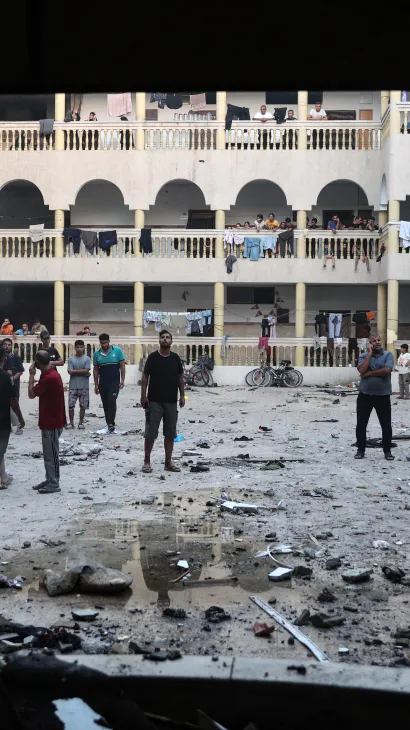
Echoes of a massacre: Tales from Israel's attack on al-Tabin
Al-Tabin School was not the first school in Gaza that Israel has targeted. But medics, journalists and survivors told Al Jazeera that Israel’s August 10 attack on it was the most gruesome massacre since Israel launched its assault on the besieged enclave in October last year.
Israel killed more than 100 displaced Palestinians, leaving victims dismembered, charred and often unidentifiable by their loved ones.
Some 2,400 displaced Palestinians, many exhausted by having been displaced several times, were sheltering in the school in eastern Gaza's Daraj neighbourhood when it was struck by two guided missiles.
The missiles blazed through the upper level, a space that women and children slept and prayed in, to reach the men's prayer area on the ground floor.
Most of the men and boys had woken up to perform the Fajr - or dawn - prayers and were gathered in that space. It was timed for maximum casualties, medics who were there said.
The nearby al-Ahli Arab Hospital - which came under attack months ago and is only partially operational with no burn ward - was overwhelmed as injuries and bodies of slain Palestinians began pouring in.
Throughout the war, Israeli forces have largely kept Gaza’s vital crossings sealed shut, blocking the entry of much-needed fuel, medicine and humanitarian aid to the enclave, where famine is looming.
Al Jazeera spoke to some of the displaced people who survived the attack but lost loved ones, as well as rescue workers and medics who worked in mute horror to save as many people as they could.
Sumaya Abu Ajwa had woken up for the Fajr prayer with her two foster daughters, 16-year-old Nuseiba and 14-year-old Retaj, and their mother.
She and the girls' mother were off to one side when the missiles struck, one of them passing between the two girls, Abu Ajwa told Al Jazeera.
"Suddenly, dust and fire spread everywhere, like it was Judgement Day. I started looking frantically for the girls," she says tearfully, sitting on a bed because she has difficulty walking.
"I found the younger girl [Retaj] and held her in my arms. Her blood was pouring onto my clothes, but I could sense that she was still breathing," Abu Ajwa said, adding that she screamed for help, for anyone to come and save Retaj, but the scene was so chaotic nobody was able to help.
Soon after, Retaj succumbed to her wounds.
The search for Retaj's big sister Nuseiba took longer.
"I went back into the flaming prayer room over and over, looking for her, I couldn't see her anywhere. Then someone told me that she was under the rubble so I went to look where they said.
"When I reached her," Abu Ajwa breaks down, "I found her and her body had been torn in two."
Weeping bitterly, she said she and the girls' mother had done everything they could, through several displacements, to keep the four of them together.
Abu Ajwa had discussed leaving al-Tabin with the girls, but Nuseiba had been reluctant to leave, she said, because she was attending Quran classes there and was proud of her progress in memorising the holy book.
"She told us that if we wanted to leave that was fine, she would stay behind in the school. I told her that I had stayed with them throughout the war and wouldn't leave them now, we'd either make it together or die together, but now they've gone on ahead and left us. They died before us."
The girls only had one wish, she added - for the war to end because they "have been scared so many times, displaced so many times, they were so exhausted and had gone hungry so many times".
The girls have a 14-year-old brother, Abu Ajwa said, who had been taken from them when the Israeli army raided al-Shifa Hospital where they were sheltering at the time.
"The Israelis sent him north on his own. We were very sad then but, who knows, this may have saved him, he's the only hope we have left.
"Who will call me Mama Sumaya now? I crave those words so much," Abu Ajwa sobs.
Suzan al-Basyouni heard the impact first then realised that the school had been targeted, with the mosque hit hardest, and ran to look for her husband who had gone to perform the Fajr prayer.
"The moments of the massacre are etched into my eyes... imagine looking for your husband amid piles of human body parts, to try to identify him and not be able to," al-Basyouni told Al Jazeera.
"Inside the mosque were piles of bodies, dismembered limbs flung around. Those very few who survived were running out of the mosque screaming, in flames.
"I was struggling to get through, stepping on bodies with my own two feet. I stepped on a woman as I was trying to find my husband. I know her, she's a friend of mine and I didn't realise that I was stepping on her. She was at the mosque's entrance."
The dark made it hard for al-Basyouni and her family to find her husband and it was only when the sun rose and rescue efforts advanced a bit that they found him under a pile of bodies.
"His legs had been blown off and his abdomen torn open. He had been martyred alongside his father.
"My solace, my only hope now is that we will find ease in heaven. There is no life left to live in Gaza, we had no idea how horrific life could be and now we know that it's all over.
"There will be no earthly justice, how could there be when we live in Gaza and nobody has moved to help us? Justice will be served by God alone."
Vascular surgery consultant Tayseer al-Tanna stood in shock in the hospital corridor, recounting what he saw after the attack in a voice he was trying to control.
"I deal in science," he said. "So, I try to use my head more than my heart when it comes to treating people.
"But that day, what I saw and what I had to do, I was working with a vice gripping my heart. Yet I kept working, I couldn't stop."
The severity and sheer number of injuries he encountered have left a lasting impression on al-Tanna.
"The burns were unlike anything I’ve seen before, covering 50...70... up to 90 percent of the victims' bodies. Many lost limbs, and so many died in surgery because their injuries were so severe," he said.
Al-Tanna used to work at al-Shifa Hospital and is now the only vascular surgeon remaining in northern Gaza, working out of al-Ahli Arab Hospital where he receives cases from all over the north.
Al Jazeera Arabic’s Anas al-Sharif was among the first journalists who reported on the direct aftermath of the attack.
"I wasn’t prepared for what I saw. The number of martyrs was beyond anything I could have imagined," al-Sharif said.
"There were bodies and limbs outside the school, but nothing could prepare me for the scenes inside. I documented what was happening outside the school and kept going.
"But when I got to the mosque that had been targeted, I was so shocked that I had no words left any more," he recalled.
"I was walking over the bodies of martyrs without realising it. A very painful scene unfolded in front of me, a girl saying goodbye to her father as he died from his burns," he said.
"It’s difficult to move past something like this. Those images, I see them everywhere... in my dreams, when I’m awake."
Asked whether this shock could make him give up journalism, al-Sharif said seeing such a crime being perpetrated against the people of Gaza only makes him more determined to carry on documenting what is happening.
"There are still families who haven't found their loved ones," he said. "The victims are nothing more than body parts.
"I went to the school after the attack and saw some families trying to clean it up, they were collecting kilos and kilos of just body parts, they don't know who they are."
Momen Silmi, a civil defence worker who was among the first to reach the school, said the scenes at al-Tabin were "terrifying", with people standing outside the school, afraid to enter.
When he and his team entered, they found the scene of the strike in flames, upstairs and down.
"Some of the victims were engulfed in flames, but they couldn't extinguish the fire because their limbs had been blown off.
"No human should have to witness such a sight," Silmi said. "But we've seen so much, we were able to go in there and try to help. I would grab anything I could find and try to put out the fires that were burning some of the injured people.
"We went upstairs and the sight I saw there was appalling. Most people were burned, dismembered, disembowelled, and they were all women and children. There were no men, not even teenagers up there.
"I saw an injured mother holding her daughter of about 18 or 19 who was badly injured... her intestines were spilling out and her hands had been blown off. She had her eyes closed and was screaming out for help: 'Baba! Don't leave me please!' she was crying, holding on to me because she thought I was her father.
"I was trying to help her while my colleague was trying to calm her mother down because she was bleeding profusely as well.
"We were all deeply branded by this experience, yes we've seen a lot and helped a lot of people in terrible conditions, but working on a disembowelled injured person while their seriously injured parent or child looked on wailing, that was horrific and will stay with us forever."
"I had just woken up really, we were about to pray Fajr at the civil defence centre," rescue worker Noah al-Sharnoubi said.
"As I walked through the carnage, I felt like I was in a dream. There were tens of bodies piled up, and dismembered body parts were strewn everywhere.
"We've seen schools targeted before, we knew to expect a dozen casualties maybe, but this time the number of bodies and injured screaming for help...
"People were screaming out to me to save their mothers, brothers, and fathers, grabbing me in desperation. Sometimes I would go to them and find that their loved ones were taking their last breaths, and I would have to leave to help someone else."
Al-Sharnoubi kept working alongside his team until all the injured people on the ground floor had been taken to hospital, then he headed upstairs to help out there too.
"As I was going up the stairs, I saw a human head on the steps with a fire blazing nearby. It was a head with part of the shoulders still attached.
"I tried to move it with my hands, but they started trembling … I lost control of myself and couldn’t lift bodies or help the injured," he said.
All the rescue workers on the site cried at some point, he added, because of the severity of the attack.
"I haven't slept for three days since the massacre. The images keep replaying in my mind. This wasn't just a massacre - it was a genocide against displaced people who sought refuge in a school.
"Believers were killed while they prayed; they were children, women and the elderly."
Read More...
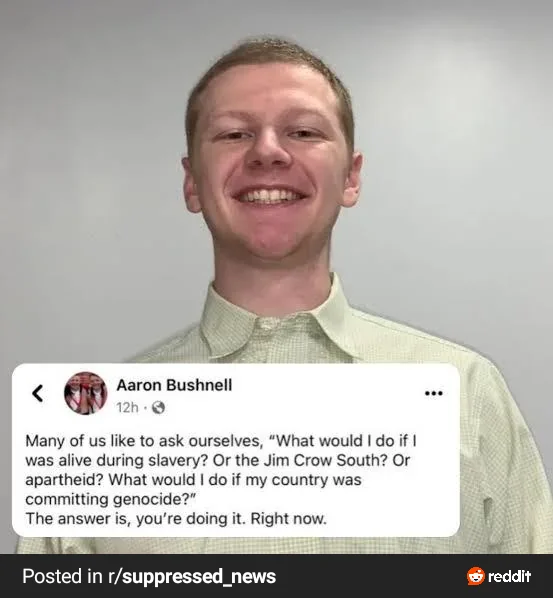
One year ago today, in protest against U.S. support for the genocide of Palestinians 25-year-old U.S. Air Force serviceman Aaron Bushnell.
Tragically ended his life by self-immolating outside the Israeli Embassy in Washington, D.C.
#EUA #Israel #Palestine #War #News #Protest
Read More...

Bernie Sanders: A Rare Politician Who Rejects AIPAC Funds and Opposes US Military Aid to Israel
Bernie Sanders remains one of the few politicians who have never accepted money from the Israeli lobby group AIPAC. He has been an advocate of blocking US military aid to Israel.
#BernieSanders #Israel #US
Read More...
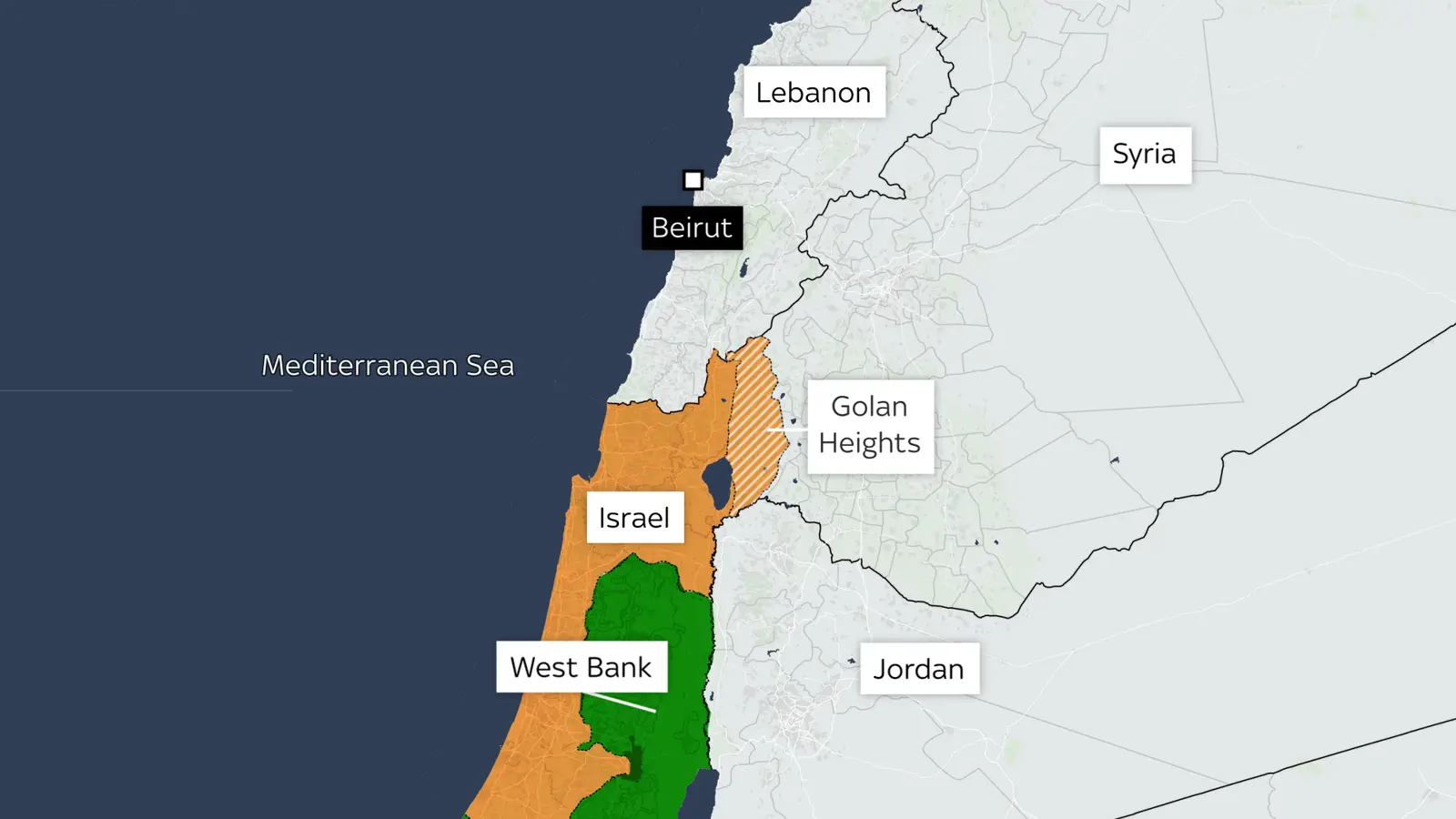
Israel will say it had no choice, but its airstrikes in Lebanon risks igniting a regional war
Israel carried out "pre-emptive" strikes against Hezbollah overnight, while the militant group says it has completed the "first phase" of an attack on 11 Israeli military sites.
This appears to have been a high-stakes Israeli military operation that risked igniting a regional war.
Israel will say it had no choice: One of the pillars of Israeli military doctrine has long been the principle that offence is the best form of defence.
It is not the first time it has used its air force hoping to defang an imminent threat. Israel insists it sent an armada of warplanes to the skies over Lebanon, more than a hundred strong, to stop an 'extensive planned attack involving thousands of rocket launches' about to be let loose by Hezbollah.
Just as Israel launched audacious air attacks obliterating Egyptian leader Gamal Abdel Nasser's air force in 1967 and Saddam Hussein's atomic programme in 1981, Israel says it despatched jets overnight to neutralise Hezbollah.
It is not clear how many enemy drones and missiles were already in the air. Hezbollah claims all 11 of its targets in Israel were hit and it launched 320 Katyusha rockets.
The primary strike it says was aimed at "a qualitative Israeli military target that will be announced later" as well as "enemy sites and barracks and Iron Dome [missile defence] platforms".
Israeli intelligence sources had claimed the airbase used in the strike on Shukr and the headquarters of Unit 8200, the Israeli military intelligence agency, north of Tel Aviv, were on Hezbollah's target list.
Advertisement
Hezbollah meanwhile says Israel's operation failed to pre-empt its long-awaited retaliation and insists it succeeded in striking targets deep within Israel.
Two questions for now: Hezbollah's next move and what this does to efforts to end the war in Gaza.
Will Hezbollah draw a line under the Shukr/Haniyeh affair? The organisation says today's action is over but is more planned in the coming days? All eyes are on its commander Hassan Nasrallah who will address his faithful by video link tonight.
He has not been seen in public since Hezbollah's war with Israel in 2006 for fear of being assassinated by Israeli jets himself.
Hezbollah attacked Israel in the wake of Hamas atrocities on 7 October and has been locked in an almost daily artillery duel with Israel over their border ever since.
Israeli intelligence claims Hezbollah has amassed an arsenal of 150,000 missiles secreted in the hills of southern Lebanon since 2006, 10 times the amount it possessed back then.
It has so far refrained from unleashing that firepower: Analysts believe its paymasters and patrons in Tehran prefer to keep that armoury in reserve as an insurance policy for the day Israel may attack Iran itself, as well as its alleged nuclear programme.
But Israel has been testing that theory for months now, responding with force to Hezbollah's attacks in the north. Each exchange of fire has the potential to escalate the region into a wider war through miscalculation and unintended mass civilian casualties.
So far, events overnight do not seem to have upended the fragile efforts towards a ceasefire in Gaza. Delegations are still on their way to Cairo for the next round of talks. If anything the escalation reemphasises the urgency behind the diplomacy.
But it could also offer the Israelis a distraction, should they want one, from huge pressure from the US to make the concessions required to reach a deal.
Most Israeli observers believe Israel's Prime Minister Benjamin Netanyahu does not want a ceasefire on the terms currently being negotiated for fear it could lead to his coalition government falling apart.
But US, Qatari and Egyptian mediators insist the truce terms are the best and possibly last chance of bringing home Israel's hostages and ending the war.
They also believe a ceasefire in Gaza is the best way of reducing tensions in the north - which have exploded overnight so spectacularly.
Read More...
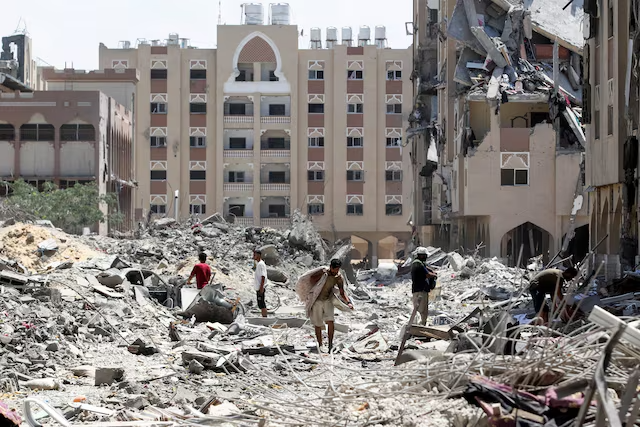
40,405 Palestinians killed in Israel's military offensive on Gaza since Oct. 7, Gaza health ministry says
CAIRO, Aug 25 (Reuters) - At least 40,405 Palestinians have been killed and 93,468 others injured in Israel's military offensive on Gaza since Oct. 7, said the Gaza Health Ministry.
In the last 24-hours, 71 were killed and 112 were injured in what the ministry called three "massacres" by Israel in the strip.
The recent war in Gaza started after Hamas militants attacked Israel on Oct. 7, killing 1,200 people, according to Israeli tallies.
Israel says it goes out of its way to avoid civilian casualties and accuses Hamas of using human shields, an allegation the group denies.
Read More...
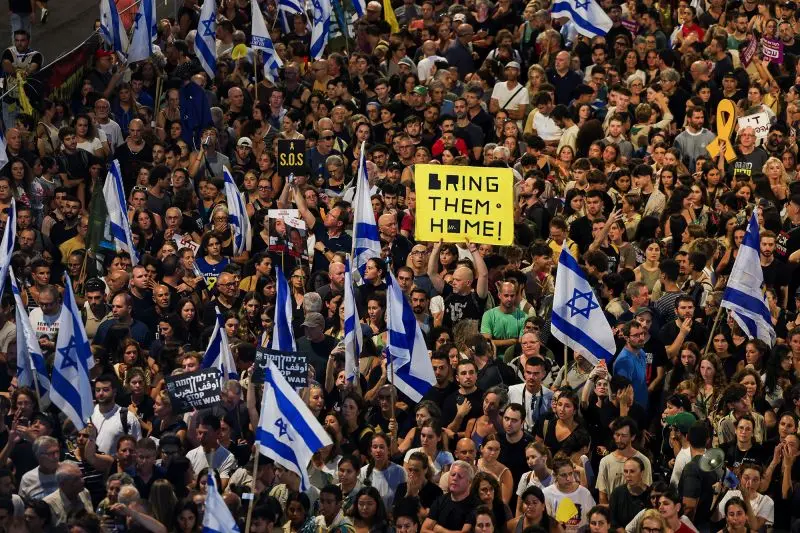
Netanyahu defiant as protesters demanding a ceasefire-for-hostages deal bring Israel to a halt
Hundreds of thousands of protesters took to Israel’s streets in fresh fury on Monday over the government’s failure to secure a ceasefire-for-hostages deal with Hamas. Demonstrations could be seen in Jerusalem, Tel Aviv, Caesarea and other sites across the country, fueled by the killing in Gaza of six hostages, whose bodies were retrieved by Israeli soldiers this weekend.
Several gatherings targeted the homes of Prime Minister Benjamin Netanyahu, with protesters lighting fires and chanting: “You are the leader - you are guilty!” near one of Netanyahu’s private residences in Caesarea. In Tel Aviv, protesters outside the US Embassy chanted “Shame!” late into the evening, video showed.
Netanyahu has been accused of stalling efforts for a deal by some hostage families and their supporters. More than 100 hostages, including 35 believed to be dead, are still being held in Gaza – the vast majority of them taken during Hamas’ October 7 attack on Israel, when some 1,200 people were killed and more than 200 taken captive
The scenes outside the Israeli leader’s homes culminated a day of anger that brought much of the country to a halt, following a call by the country’s largest labor union, known as Histadrut, to shut down the “entire” economy. Flights in and out of Tel Aviv’s Ben Gurion International Airport were also stopped for two hours.
But in a press conference Monday evening, the Israeli leader struck a note of defiance, batting away criticisms – including from US President Joe Biden – that he is not doing enough to secure a deal. He asked for “forgiveness” from the families of the six hostages for failing to bring them back alive, but insisted it should be Hamas that “has to make the concessions.”
He also vowed to retaliate and extract a “heavy price” from the militant group that controls Gaza, for the killing of the six hostages, whose autopsies showed they were shot at short range on Thursday or Friday morning.
Hamas meanwhile escalated its own threats on Monday, with a public warning that more hostages held in Gaza would return “inside coffins” if Israel attempts to free them militarily.
A statement released by the militant group said that its fighters guarding prisoners held in the Palestinian enclave had received “new instructions” on how to deal with hostages if Israeli forces get close, and released an illustrated poster apparently showing hostages threatened with a gun.
Monday saw the largest general strike to have taken place in Israel since March 2023, when there was a similar mass walkout over Netanyahu’s controversial attempts to overhaul the country’s judiciary.
According to union Histadrut, hundreds of thousands of Israelis joined the protests Monday, just a day after half a million took to the streets on Sunday for what protest organizers said was one of the biggest nationwide protests since the outbreak of Israel’s war on Hamas. Israeli police said they had seven demonstrators in Tel Aviv for “violating public order and disrupting traffic.”
‘Netanyahu has made it impossible’
Netanyahu’s defiant stance following the discovery of the six hostage bodies has thrown further doubt on the negotiations for a ceasefire-for-hostages deal.
Even before the killing of the six hostages, the talks had become bogged down, with one key disagreement centering on control of a border area known as the Philadelphi corridor.
Netanyahu says control of the 14-kilometer (8.7-mile) strip of land along Gaza’s border with Egypt is needed to prevent Hamas from resuming arms smuggling through tunnels underneath it. However, the deployment of Israeli troops along the corridor has been a major point of contention between Israel and Hamas in the ceasefire talks, with Hamas saying Israeli troops must withdraw from the border zone.
“Hamas doesn’t want us to be there and that’s why I insist on being there,” the Israeli leader said on Monday.
During a cabinet meeting over the weekend, Israeli Defense Minister Yoav Gallant had lambasted the Israeli government for what he said was prioritizing control of the corridor over a deal to free hostages, calling it a “moral disgrace.”
The relative of one of the hostages who was shot dead in southern Gaza also blamed Netanyahu and his stance on the corridor for their deaths. Gil Dickmann, the cousin of Carmel Gat, told CNN that the Israeli government “cold-bloodedly” crossed a “red line” by prioritizing the corridor over the lives of the hostages.
“We know that Hamas has agreed to a deal at some point, and Israel was the one putting on more and more terms and actually postponing the deal,” Dickmann said on Monday. “Right now, we know the decisions that our Prime Minister Netanyahu has made it impossible for Carmel and other hostages to return and put their lives in great danger, and that’s what killed them.”
But on Monday, even as he acknowledged dissent within his cabinet, Netanyahu doubled down.
“We’re not going to withdraw from the Philadelphi corridor,” Netanyahu told a press conference on Monday evening. “The axis of evil needs the Philadelphi corridor. We need to have it under our control,” he said.
Disagreements over the corridor are only one of the splits within the cabinet over the conduct of the war that have become increasingly public and rancorous in recent months, reflecting deep divisions at the top of Israel’s government.
Just on Monday, Israel’s far-right National Security Minister Itamar Ben-Gvir said he was using his power to prevent a “reckless deal” and ensure “that there will be no negotiations at all.”
He was speaking to members of Gvura, a right-wing organization representing the families of Israeli soldiers killed in Gaza.
But American officials described new urgency in reaching a ceasefire-for-hostages deal. US national security adviser Jake Sullivan said while meeting the families of Americans held hostage that “the next few days will be critical” in the push to free those still held by Hamas.
Alongside the strikes, the funeral of Hersh Goldberg-Polin, one of the six hostages found dead, was held in Jerusalem on Monday. Speaking at the ceremony, Jon Goldberg-Polin said he hoped his son’s death would be “the fuel that will bring home the remaining 101 hostages.”
“Hersh, we failed you. We all failed you. You would not have failed you. You would have pushed harder for justice,” he said. “You would have worked to understand the other, to bridge differences.”
“The 23 years of life that we had with you were a blessing. We now will work to make your legacy a similar blessing,” Goldberg-Polin said. “You were a really great guy. I love you.”
Strike hits public services, schools
As well as an impact on flights, some Israeli municipalities said they joined the strike, including Tel Aviv and Haifa, according to a list from the Histadrut outlining who joined the action as well as statements from some of the cities.
The list also includes government ministries that impact a wide range of public services, the document shows, including parts of the Prime Minister’s Office, the Interior Ministry, and others. CNN has reached out to the Prime Minister’s Office for comment.
Hospitals and healthcare facilities worked on a weekend schedule and on an emergency basis, according to the statement.
The country’s teachers’ union said it would not join the strike, according to a statement from the union, though support staff at schools did.
However, Israel’s biggest universities joined the strike, including the Hebrew University of Jerusalem and Tel Aviv University.
#news #world #breakingnews
Read More...
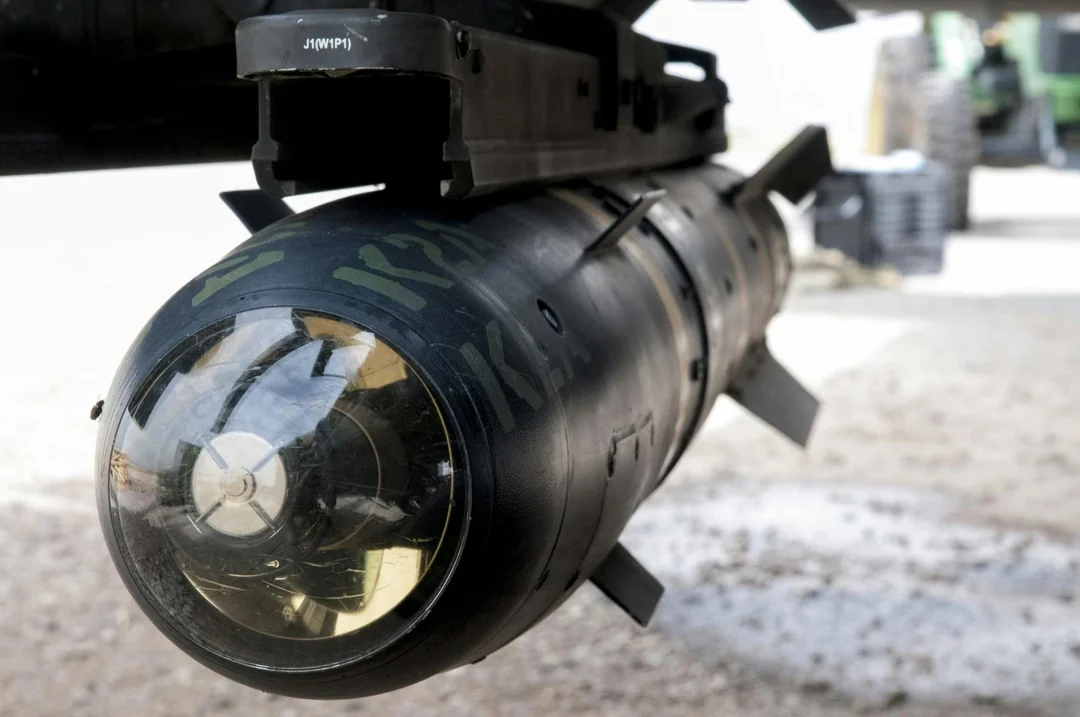
Israel to purchase over 8,000 missiles and bombs from U.S.
The United States has approved two major Foreign Military Sales (FMS) to Israel, valued at £6 billion ($7.41 billion), aimed at bolstering the Israeli Air Force’s operational readiness with advanced missiles and precision-guided munitions.
The first sale involves 3,000 AGM-114 Hellfire Air-to-Ground Missiles, comprising a mix of variants such as R3, F, and K. The package, valued at £520 million ($660 million), includes spare parts, test equipment, software support, and technical assistance.
Lockheed Martin will serve as the primary contractor, with deliveries beginning in 2028.
#Israel #News
Read More...

